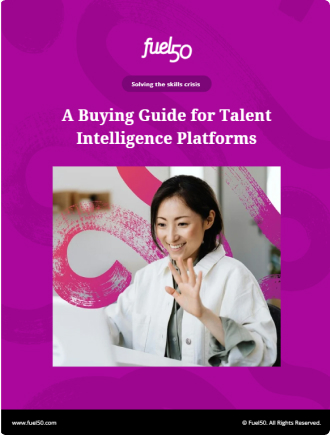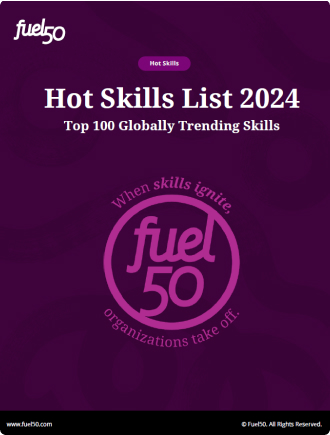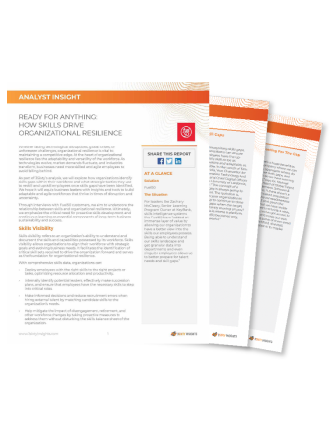Originally published on Inspiring Workplaces. Written by Anne Fulton, CEO and Founder of Fuel50 – the Intelligent Talent Marketplace powered by Skills, Insights & Architecture.
As the world of work shifts toward a skills-focused economy, it’s clear that the future of talent development and hiring lies with skills – the foundation of the modern workforce.
According to McKinsey research, a skills-based approach is a fresh lens on work that moves beyond degrees and job titles to focus more on the skills a job requires. As we begin to value skills over traditional requirements, the way we manage, hire, and develop talent must evolve for organizations to remain competitive and successful in our current work environment.
Let’s explore why and how a skills-based approach is critical for hiring and developing today’s workforce.
A Skills-Based Approach Broadens Your External And Internal Talent Pool
The last few years have brought with it many challenges, including ongoing talent shortages, difficulties in talent acquisition and retention, and rapid advancements in technology. We are working in an ever-changing environment that requires organizations to become agile and adaptable to global and economic changes.
This triggered the widespread adoption of skills-based strategies as they presented powerful solutions that helped solve and mitigate many of these challenges. Accepting skills as the new currency of work enables organizations to acquire and develop critical skills needed to operate efficiently.
It also opens doors for job seekers, giving them the opportunity to apply for jobs based on their skill sets rather than previous experience or education. With the talent shortage still at play today, skills-based hiring encourages HR to tap into diverse pools of talent and consider candidates who have traditionally been excluded from such opportunities.

Robin Erickson, Ph.D., Vice President of Human Capital at The Conference Board, says organizations can tackle skills and talent shortages by redesigning job roles in ways that expand the pool of candidates. Consider untapped sources of talent – independent contractors, freelancers, people with disabilities, retired seniors, and college students.
Another overlooked source of talent is your existing workforce. A skills-based approach supports internal mobility by prioritizing skills and career visibility so organizations gain a deeper understanding of the skills they have, the skills they need, and where certain skills should be deployed. This combined with internal career visibility empowers employees to develop their skill sets and achieve their goals and ambitions.
Evaluating employees and new hires based on their skill sets instead of their work history can help level the playing field — and help companies realize the talent they already have. It also makes talent pools more diverse and often makes hiring more effective. – Harvard Business Review
More Organizations Are On The Road to Building a Skills-Based Workforce
According to Deloitte, skills-based organizations are 107% more likely to place talent effectively, 98% more likely to have a reputation as a great place to grow and develop, and 57% more likely to anticipate change and respond effectively. The benefits here are undeniable, proving just how powerful a skills-based approach can be.
KeyBank, Avalere Health (Formerly Fishawack Health), and CarTrawler are just some of the organizations taking steps toward skills-centricity, adopting technologies such as a skilled-based Talent Marketplace to drive their transformation. These organizations and many others have recognized the need for deeper skills visibility to inform their learning, reskilling, and upskilling initiatives to ensure they are strategic and intentional.
Being able to understand our skills landscape and get granular data into departments and even singular employees allows us to better prepare for talent needs and skill gaps.” – Zachary McCleary, Senior Learning Program Owner at KeyBank
Fuel50’s guide for transforming into a skills-based organization highlights three key steps to becoming a skills-based organization, including:
- Implement a more flexible, agile workforce architecture: Update your career framework to be skills-centric by reviewing all role descriptions and updating them with the skills needed for each role.
- Take a skills-based approach to talent development: Adopt technologies that surface the skills you currently have within your organization and identify skills gaps that need to be filled.
- Implement agile methodologies: Prioritize individuals and interactions over processes and tools and prioritize responding to change over following a plan.
When thinking about a skills-based approach, the key is to build skills transparency to understand the skills the organization needs now and in the future. This enhances talent development by:
- Creating visibility of the skills across the organization
- Highlighting skills gaps, allowing organizations to plan upskilling initiatives
- Creating a common organization-wide approach to skills and talent management
- Transforming talent strategies to include skills management strategies that enable upskilling and reskilling

Investing in Skill-Building Technology Must Be a Priority
The need for skills-based strategies is abundantly clear, however, the right technology is also needed to successfully transform into a skills-based organization. A skills-powered talent marketplace is a powerful tool that modernizes workforce architecture, provides deeper skills visibility, and supports the development and prioritization of skills.
Once you understand the skills you have and need, you will be able to make better decisions around hiring, training, and development, proactively setting your organization up for future success.
Understanding the most effective HR strategies, trends, research, and practices is essential for organizations to thrive in today’s fast-paced environment. Keep up to date with Fuel50’s latest learnings and research here.











